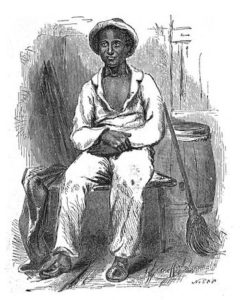
Solomon Northup
*Solomon Northup was born on this date in 1807. He was a Black musician, abolitionist, and author.
Born in Rhode Island, he was taken with the Northup family when they moved to Hoosick, New York, in Rensselaer County. His father, Mintus, was a freedman who had been a slave in his early life in service to the Northup family. His master, Capt. Henry Northup freed Mintus in his will; Mintus adopted the surname Northup as his own. Mintus Northup married and moved with his wife, a free woman of color, to Minerva in Essex County, New York. Their two sons, Solomon and Joseph, were born free as their mother was a free woman.
A farmer, Mintus Northup, was successful enough to own land and thus meet the state's property requirements. From 1821 on, when it revised its constitution, the state retained the property requirement for blacks but dropped it for white men, thus expanding its franchise. He taught his two sons as boys; Northup and his brother worked on the family farm. Mintus Northup died on November 22, 1829, and his grave is in Hudson Falls Baker Cemetery.
In 1828, Solomon Northup married Anne Hampton, who was of African, European, and Native American descent. Between 1830 and 1834, the couple lived in Fort Edward and Kingsbury, small Washington County, New York communities. They had three children: Elizabeth, Margaret, and Alonzo. They owned a farm in Hebron and supplemented their income with various jobs. Northup was a farmer, a professional violinist, and a landowner in Hebron, New York.
In 1841, he was offered a traveling musician's job and went to Washington, D.C., where slavery was legal; there, he was drugged, kidnapped, and sold as a slave. Northrup was held in an area of Richmond called Shockoe Bottom. He was shipped to New Orleans, purchased by a planter, and held as a slave for 12 years in the Red River region of Louisiana, mostly in Avoyelles Parish. He remained a slave until he met a Canadian working on his plantation who helped get word to New York, where state law provided aid to free New York citizens kidnapped and sold into slavery. His family and friends enlisted the aid of the Governor of New York, Washington Hunt, and Northup regained his freedom on January 3, 1853.
The slave trader in Washington, D.C., James H. Birch, was arrested and tried but acquitted because District of Columbia law prohibited Northup, as a black man, from testifying against white people. Later, his northern kidnappers were located and charged in New York State. Still, the case was tied up in court for two years because of jurisdictional challenges and finally dropped when Washington, D.C., was found to have jurisdiction. The D.C. government did not pursue the case. Those who kidnapped and enslaved Northup received no punishment.
In his first year of freedom, Northup wrote and published a memoir, Twelve Years a Slave (1853). He lectured on behalf of the abolitionist movement, giving more than two dozen speeches throughout the Northeast about his experiences to build momentum against slavery. He largely disappeared from the historical record after 1857. His memoir was adapted and produced by Gordon Parks as the 1984 television film Solomon Northup's Odyssey and the 2013 feature film 12 Years a Slave. The latter won three Academy Awards, including Best Picture, at the 86th Academy Awards. Solomon Northup died in 1863.